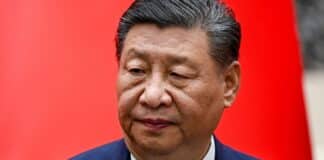Reform UK leader Nigel Farage issued a stark warning Friday following the Yom Kippur terrorist attack outside a Manchester synagogue, saying Britain is facing “societal breakdown.” His remarks came as pro-Palestinian demonstrations erupted across the country within hours of the attack, which left two worshippers dead and several others injured.
Speaking in a video message, Farage condemned the killing of Adrian Daulby, 53, and Melvin Cravitz, 66, outside the Heaton Park Hebrew Congregation in Crumpsall, describing it as a “devastating act of evil.” He said, “The scenes of Jewish people being butchered on the streets of Manchester yesterday shocked many of us to the core. Our absolutely most sincere condolences go out to the victims and their families.”
Farage warned that the problem extended beyond the attack itself, pointing to the scenes that followed: “Within just a few hours, we saw in London, Glasgow, and elsewhere pro-Palestinian flags on the streets. They weren’t demonstrating—they were celebrating.” He said such open displays of hate showed Britain’s moral decline.
The Reform UK leader criticized the government’s weak response, calling Home Secretary Shabana Mahmood’s statement of “disappointment” wholly inadequate. “That’s the most the Home Secretary can say?” Farage asked. “Well, I hope all of you watching are outraged—and frankly frightened.”
Farage said Prime Minister Keir Starmer had “emboldened” extremists by recognizing a Palestinian state two weeks earlier. “Never forget, this is the prime minister who took the knee to an extremist group,” he said, warning that an upcoming “hate march” planned for London could further inflame tensions.
Chief Rabbi Sir Ephraim Mirvis echoed Farage’s concern, saying the attack came amid “an unrelenting wave of Jew hatred on our streets, campuses, and social media.” Police identified the attacker as Jihad al-Shamie, 35, a British citizen of Syrian origin, who was on bail for rape allegations at the time.
Farage closed his message with a grim assessment: “I feel more worried about the state of broken Britain than I ever have before.”





